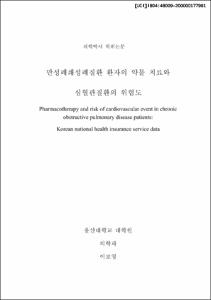만성폐쇄성폐질환 환자의 약물 치료와 심혈관질환의 위험도
- Abstract
- 연구 배경: 만성 폐쇄성 폐질환은 유병률이 높고 주요 사망원인 중 하나로 점차 증가할 것으로 예상되고 있다. 이러한 만성 폐쇄성 폐질환의 주요 치료 방법으로는 약물치료가 있는데 약물치료는 증상을 완화시키고 삶의 질을 향상시키며 급성 악화를 예방하는데 목적이 있다. 주요 약물치료제로는 베타 작용제와 항콜린제와 같은 흡입 기관지 확장제가 권유되고 있다. 베타 작용제는 기관지의 평활근의 이완을 가져오지만 자율신경계를 자극하여 떨림, 불안감, 저칼륨혈증 및 동성빈맥과 같은 부정맥을 유발하기도 한다. 항콜린제의 경우에는 부교감 신경의 자극을 막아 그 효과를 낸다. 많은 만성폐쇄성폐질환 환자들은 심혈관 질환을 동반질환으로 가지고 있는 경우가 많고 기관지 확장제는 위와 같은 작용기전이 있어 심혈관 질환에 부작용이 있을 수 있다는 문제점이 있다.
연구 목적: 본 연구에서는 만성 폐쇄성 폐질환 환자에서 흡입 기관지 확장제가 심혈관 질환에 미치는 영향에 대하여 알아보고자 한다.
연구 방법: 한국의 국민건강보험 청구 자료 중 표본 코호트 데이터 베이스를 사용하여 약제 처방 패턴을 확인하고 환자-대조군 연구를 시행하였다. 구축된 코호트에서 심혈관 질환으로 인한 입원이나 응급실 방문이 있었던 환자군과 이에 성별, 나이, 이전 1년감 심혈관 질환력으로 1:4의 비율로 짝을 맞춘 대조군을 비교하였다. 심혈관 질환으로 인한 입원이나 응급실 방문이 있었던 시점을 기준으로 1년이내의 흡입 기관지 확장제 사용여부를 확인하여 로지스틱 회귀분석을 시행하였다.
연구 결과: 약제 처방 패턴을 분석한 결과 흡입 기관지 확장제의 사용이 증가하고 있으나 여전히 약 90%의 환자가 만성 폐쇄성 폐질환으로 진단받은 후 첫 처방으로 경구약제인 메틸잔틴이나 전신 베타 작용제를 처방받았다. 흡입 기관지 확장제의 심혈관 질환에의 영향을 보기 위하여 시행한 환자-대조군 연구에서는 대상 코호트를 정의하는 것에 따라 상반된 결과를 보였다. 만성폐쇄성 폐질환의 진단과 함께 전신 베타 작용제와 메틸잔틴과 같은 경구약제를 제외한 속효성 및 지속성 기관지 확장제를 처방받은 환자들만을 대상으로 분석을 하는 경우 흡입 지속성 베타작용제나 흡입 지속성 항콜린제를 30일 이내에 처방받아 새로 시작한 경우 오즈비가 각각 0.2와 0.59로 유의하게 심혈관 질환 부작용 발생의 확률이 감소하는 것으로 확인되었다. 이와는 반대로 전신 베타 작용제와 메틸잔틴과 같은 경구약제와 흡입 기관지 확장제 중 하나라도 처방받은 환자들을 대상 코호트로 정의하는 경우 흡입 지속성 베타 작용제를 30일 이내 새로 시작한 경우 심혈관 질환으로 인한 응급실 방문 및 입원 확률이 3.12배로 증가하는 것으로 나타났다. 흡입 지속성 항콜린제의 경우에도 베타작용제와 비슷하게 위험도가 6.31배 증가하는 것으로 나타났다.
결론: 동일한 인구집단에서 연구가 시행됐음에도 불구하고 대상자의 정의에 따라흡입 기관지 확장제가 심혈관 질환으로 인한 응급실 방문 또는 입원의 위험도에 미치는 영향은 서로 상반된 결과를 보였다. 이는 대상 환자들의 특성의 차이에서 기인하는 것으로 생각된다. 주로 만성 폐쇄성 폐질환의 중증도가 심한 경우에는 약제 사용으로 인한 부작용보다 만성 폐쇄성 폐질환의 조절로 인한 심혈관 질환에 긍정적인 효과가 더 크며 반대로 경도의 만성폐쇄성 폐질환에서는 심혈관 질환 부작용이 증가할 수 있으므로 약제 시작 시 주의 깊은 모니터링이 필요하겠다.
|Background: Chronic obstructive pulmonary disease (COPD) is prevalent and is one of the major causes of death. COPD is expected to increase in the future. pharmacotherapy in COPD aims to relieve symptoms, improve quality of life and prevent acute exacerbations. Inhaled bronchodilators, such as ß-agonists and anticholinergics, are being recommended as major medications. ß-agonists cause relaxation of the smooth muscle of the bronchi, but they also stimulate the sympathetic nervous system, leading some side effects such as arrhythmias, tremor, agitation and hypokalemia. In case of inhaled anticholinergic agents, the stimulation of the parasympathetic nervous system is inhibited which can also lead to diverse side effects. Many patients with COPD have cardiovascular disease as a comorbid condition. And bronchodilators may have side effects on cardiovascular disease because of the action mechanism mentioned above.
Purpose: To evaluate the effect of inhaled bronchodilators on cardiovascular events in patients with COPD.
Methods: A 2% sample cohort database from Korean National Health Insurance claim data was used to identify drug prescription patterns. And nested case-control study was done to assess effect of inhalers on cardiovascular events. We compared the patients who had admission or emergency department visits due to cardiovascular disease with the matched control group. Cases and controls were matched by sex, age (±2years), and the number of cardiovascular events in the previous year in 1: 4 ratio. The use of inhaled bronchodilator was identified retrospectively within 1 year from index date (the first date of cardiovascular events).
Results: Prescription of inhaled bronchodilators is increasing over the decade. However, about 90% of patients diagnosed as COPD received methylxanthine or systemic ß-agonist at first prescription. Nested case-control study to examine the effect of the inhaled bronchodilators on cardiovascular events showed conflicting results depending on the target cohort. In current new users of LABA or LAMA, OR was decreased to 0.2 (95% CI, 0.05 - 0.87) and 0.59 (59% CI, 0.38 - 0.91), respectively if target cohort included only inhaled bronchodilators. Conversely, if the target cohort is defined as those prescribed with either oral or inhaled bronchodilators, the risk of cardiovascular events was found to be increased in LABA and LAMA current new users (OR, 3.12 and 6.31 respectively)
Conclusions: Despite studies in the same population, the effect of inhaled bronchodilators on the risk of emergency room visits or hospitalizations due to cardiovascular disease was conflicting. This may be due to differences in characteristics of the patients. In severe COPD, control of COPD may protect patient from cardiovascular events because these two diseases interact each other. On the contrary, in mild COPD, physicians need to be cautious and monitor for possible adverse events, because the use of new bronchodilators may increase the risk of cardiovascular disease.
- Issued Date
- 2018
- Awarded Date
- 2019-02
- Type
- Dissertation
- Alternative Author(s)
- Bo young Lee
- Affiliation
- 울산대학교
- Department
- 일반대학원 의학과
- Advisor
- 오연목
- Degree
- Doctor
- Publisher
- 울산대학교 일반대학원 의학과
- Language
- eng
- Rights
- 울산대학교 논문은 저작권에 의해 보호받습니다.
- Appears in Collections:
- Medicine > 2. Theses (Ph.D)
- 파일 목록
-
-
Download
 200000177991.pdf
기타 데이터 / 797.31 kB / Adobe PDF
200000177991.pdf
기타 데이터 / 797.31 kB / Adobe PDF
-
Items in Repository are protected by copyright, with all rights reserved, unless otherwise indicated.